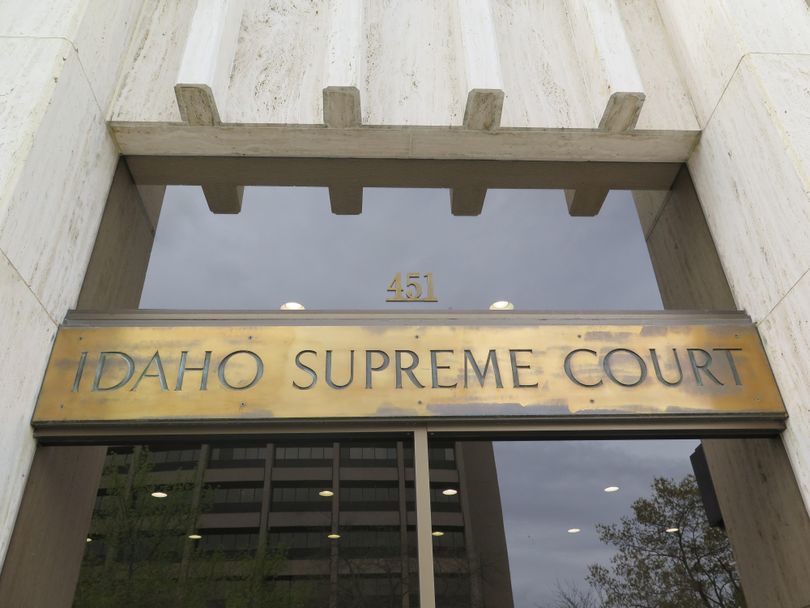Regan’s Kootenai County road-easement case goes to Idaho Supreme Court for 3rd time

Here's my full story from spokesman.com:
By Betsy Z. Russell
The Idaho Supreme Court heard arguments Friday in a Kootenai County road-easement case that already has prompted a change in state law, but still has left plaintiff Brent Regan without access to a private road he claims he long used as a secondary access to his sprawling property.
Regan and his wife, Moura, had been both using and improving the private, unpaved road for nine years, said his attorney, Art Macomber, including to bring in materials to build a runway on his roughly 50-acre property; however, that was disputed by his neighbors. Because of a series of surveying and conveyance errors, the slice of road ended up in no one’s ownership, and the county took it by tax deed after no one paid property taxes on it.
Regan’s neighbors, Jeff and Karen Owen, purchased the property from the county, and Regan asserted that he had a “prescriptive easement” to continue to use the road – a right that develops simply from use, without ever being recorded or subject to any legal process. Though a district court initially agreed, the Idaho Supreme Court disagreed in 2014, saying state law regarding property taken by a county for unpaid taxes extinguishes all “encumbrances,” such as mortgages or liens, and that includes things like Regan’s easement claim. The district court then ruled in favor of the Owens.
While appeals in the case still were pending at the Idaho Supreme Court, the Idaho Legislature in 2016 changed the law governing tax deed sales and encumbrances. Lawmakers cited concerns that the court’s interpretation also would put at risk public utility easements, ditch rights, public highways, conservation easements and other claims when property is sold for unpaid taxes. The new version of the law gives the new owner the same ownership rights as the previous owner, rather than “absolute title … free of all encumbrances.” It also declares that easements and road rights-of-way aren’t transferred in tax deed sales.
Then-Senate Majority Leader Bart Davis, R-Idaho Falls, sponsored the bill, which passed unanimously and included an emergency clause. It declared that the bill was a “clarification of existing law” and “shall be interpreted to apply to any and all conveyances by tax deed, past or future.” The bill was championed by the Idaho Association of Highway Districts and backed by Avista Corp. and others.
Then, in September, the Idaho Supreme Court ruled that the law change didn’t apply to the Regan case – because it wasn’t retroactive.
“If the Legislature wished to clearly convey retroactive intent it could do so, and has in other instances,” Justice Joel Horton wrote for the majority. “The Legislature is empowered to make laws, and this Court is empowered to interpret them. … It cannot direct this Court’s interpretation of statutes.”
The September ruling was a 3-2 decision, with Justice Robyn Brody dissenting, joined by Justice Warren Jones. Brody didn’t differ with the ruling on retroactivity. Instead, she argued that an easement shouldn’t legally be considered an “encumbrance” – so it could survive a tax deed sale. Macomber petitioned for re-hearing, and that’s what led to Friday’s arguments.
Macomber told the justices he believed the court’s interpretation of what an “encumbrance” is actually went beyond what lawmakers envisioned when they originally wrote the law – so the court was stepping on the Legislature’s toes when it first took that position in a 1929 case.
Coeur d’Alene attorney Susan Weeks is representing the Owens. She argued that the justices interpreted the law correctly, both in 1929 and in the Regan case. “‘Encumbrances’ was a common term, and was used by the courts, and understood by the legislators who were writing the statutes – and it was understood to include easements,” she said.
Under long-established Idaho law, property that’s sold for tax deed passes to the new owner free and clear, unless there’s a legal mortgage or lien holder who wasn’t properly given notice of the tax deed sale. Under questioning from Brody, Weeks said there’d be no way to give notice to someone who claims a prescriptive easement, which is never recorded.
“A prescriptive easement is never known until somebody steps into a court,” she said.
Macomber noted after Friday’s arguments that it’s rare for the Idaho Supreme Court to grant re-hearing of a case it’s already decided, and that the court now has a new justice – Justice Richard Bevan has joined the court to replace retired Justice Daniel Eismann, who joined the majority opinion in September along with Chief Justice Roger Burdick. Macomber said that offers his client “glimmers of hope.”
Macomber argued that eliminating a neighboring property owner’s easement rights without any due process amounts to a taking of the property by the government without compensation.
